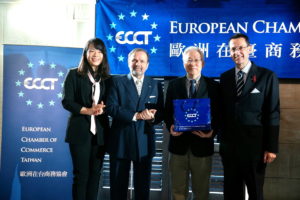[Event Report] LCI 2020 Annual Meeting & MOST Minister Lunch LCI 2020 會員大會暨科技部部長午餐會
The ECCT Low Carbon Initiative LCI held its Annual Meeting to elect the 2021 new Steering Committee, introduce 18 new members of 2020, and present 2021 roadmap.
Over 60 LCI members voted for Ms. Jennifer Wang, Managing Director of TUV Rheinland Taiwan, and Mr. Toshiaki Kimura, General Manager of JERA Energy Taiwan to serve as LCI Steering Committee of 2021 together with Giuseppe Izzo, MD Taiwan & VP, APAC Region STM, Eric Yu, General Manager & Global VP of Signify Taiwan, ECCT CEO Freddie Hoeglund, and ECCT LCI Director Sammy Su.
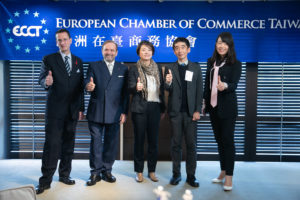 LCI 2021 New Steering Committee, from left to right: Freddie Hoeglund, Giuseppe Izzo, Jennifer Wang, Toshiaki Kimura, Sammy Su
LCI 2021 New Steering Committee, from left to right: Freddie Hoeglund, Giuseppe Izzo, Jennifer Wang, Toshiaki Kimura, Sammy Su
The LCI members thanked and cheered for two outgoing Steering Committee Mr. Bart Linssen (黎森) and Dr. John Pien for their leadership in the LCI for the past years guiding the LCI toward achieving remarkable goals.
-
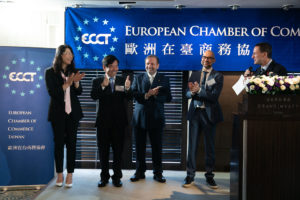 LCI 2020 Steering Committee, from left to right: Sammy Su, John Pien, Giuseppe Izzo, Bart Linssen, Freddie Hoeglund
LCI 2020 Steering Committee, from left to right: Sammy Su, John Pien, Giuseppe Izzo, Bart Linssen, Freddie Hoeglund-
The LCI welcomes 18 new members in 2020: (in alphabetical order)
#Airliquide亞東氣體#CCTC中國貨櫃運輸公司#ICDI國際氣候發展智庫#ItalianOffice義大利辦事處#JaneGoodallInstitute珍古德協會#JardineSchindler迅達#JERA捷熱能源#LiohoMachineWorks六和機械#MacquarieGIG麥格理綠投資集團#NCKU成功大學#NTUT台北科技大學#P&G寶僑#Reiju瑞助營造#ResetCarbon鋭思碳管理#SYSGRATION系統電子#TCI大江生醫#TESLA特斯拉#YourSolution祐貹工程
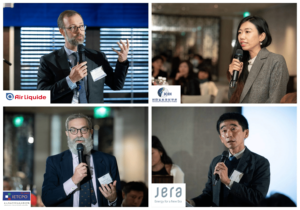
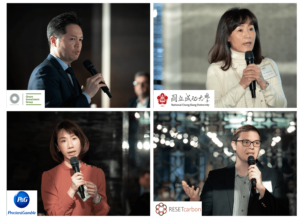
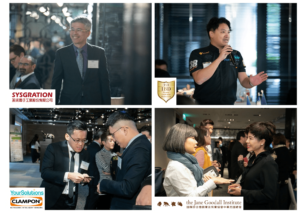
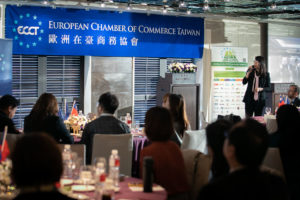
2020 Event Review & 2021 Roadmap Introduction by Sammy Su
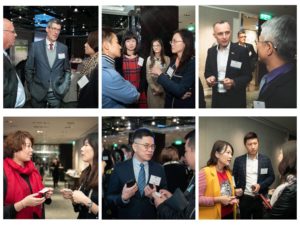
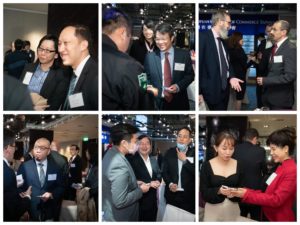 -
-After the annual meeting, the ECCT hosted a Premium Event lunch with Dr. Wu Tsung-tsong, Minister of the Ministry of Science and Technology (MOST). The minister gave a presentation on the topic "Accelerating the transition to a Smart Taiwan post Covid-19" and answered questions from members during a Q&A session.
In his introduction, Minister Wu noted that while Covid-19 has overshadowed almost every other subject of discussion this year, it has not changed the plans or priorities of the MOST. According to Wu, the MOST takes a holistic and long-term approach in its planning that considers not just technology but also the impact on people and environment. He reminded the audience that while everyone is preoccupied with Covid-19 at the moment, just a year ago, they were concerned about protests in Hong Kong and the US-China trade war.
-
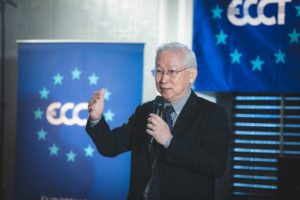
Dr. Wu Tsung-tsong, Minister, Ministry of Science and Technology, is sharing an ageing and declining population and urbanization produce challenges for the workforce
The pandemic has sped up some of the trends that were already ongoing before the pandemic. Taiwan is facing similar trends as the rest of the world and the consequent challenges posed by these trends. For example, an ageing and declining population and urbanization produce challenges for the workforce, while digitalization, automation and disruptive business models are affecting employment and producing income inequality. However, Wu expressed optimism that these challenges can be addressed by, for example immigration. He said that more and more "second generation Taiwanese" (those born abroad to Taiwanese parents) are moving to Taiwan with their young families to start new jobs or businesses.
In its 2030 plans, the MOST highlights goals to create a circular and sustainable society (with zero waste and zero pollution), a diverse and inclusive society (an integrated cross-cultural and trans-generational society), an innovative-driven and connected society (with virtual reality integration that connects people and things, such as AI, 6G and robots). The MOST's digital strategy for Post Covid-19 industrial recovery includes industrial support, unemployment relief, cyber security, digital transformation for SMEs and internet penetration in rural areas.
-
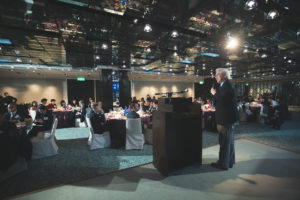 -
-
Minister Wu is optimistic about the future given that Covid-19 has prompted a rethink of global supply chains and the steady rise in inbound investments into Taiwan, both from foreign and Taiwanese investors. He cited a figure of US$120 billion in pledges for investments in Taiwan's technology parks.
Wu said he sees many opportunities as all industries adapt to and embrace digitalization. Taiwan also has great potential in the field of precision healthcare by combining Taiwan's comprehensive medical insurance system, excellent medical professionals and skills as well as inclusive ICT infrastructure to develop precise medicine. According to Wu, Taiwan has 31 sets of biobanks and 4.5 million sets of specimens. Using cloud computing and sophisticated analysis, this data can be harnessed for research into developing precision medicine. The MOST's other areas of focus are green energy, smart machinery and advanced agriculture. Cyber security is another important area that the MOST is paying close attention to and in which Mister Wu expects greater cooperation with European and American partners in future. According to Wu, Taiwan is building up its cyber security capacity though cultivating talent and advanced cyber technologies to deal with foreign cyber security threats.
-
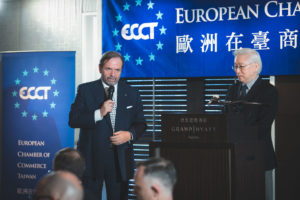 Mr. Giuseppe Izzo, LCI Steering Committee, is raising questions to Dr. Wu
Mr. Giuseppe Izzo, LCI Steering Committee, is raising questions to Dr. Wu
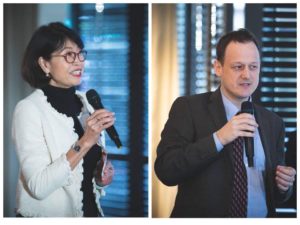 Ms. Irene Feng, Managing Director, Fresenius Medical Care, Mr. Thomas Kuiper, General Manager, Gandi Asia Co., Ltd. is raising questions to Dr. Wu
Ms. Irene Feng, Managing Director, Fresenius Medical Care, Mr. Thomas Kuiper, General Manager, Gandi Asia Co., Ltd. is raising questions to Dr. Wu
Taiwan has been called one of the world's top four "super innovators", together with Germany, the US and Switzerland for two consecutive years while Taiwan ranked No. 11 in IMD's World Digital Competitiveness Ranking 2020. Taiwan has also been recognized by top global tech companies for its potential. For example, Microsoft established an AI innovation centre in Taiwan in 2018 while Google is cultivating talent and Synopsis has established an AI design centre.
